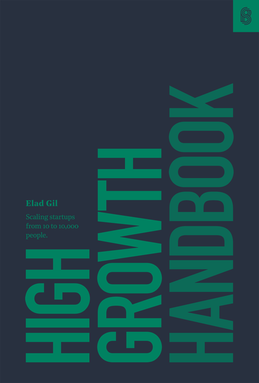|
"Promise me you gon' stack, promise me you gon' ball / Promise me you'll invest three fourths of it all" Andre 3000, Hollywood Divorce Elad Gill is an entrepreneur and investor who was at Google when it went from 1,500 to 15,000 employees and, when Twitter acquired his company, he saw Twitter grow from 100 to 1,500 employees and stayed on as an advisor to the CEO/COO as its growth continued. He's also invested in Coinbase, Airbnb, Square, Strip, and many others. He recently published the High Growth Handbook to help entrepreneurs survive their high growth phase. Here are my key takeaways. 1. Distribution > Product once you break through product-market fit and scale
"In fact, the general model for successful tech companies, contrary to myth and legend, is that they become distribution-centric rather than product-centric. They become a distribution channel, so they can get to the world. And then they put many new products through that distribution channel. One of the things that’s most frustrating for a startup is that it will sometimes have a better product but get beaten by a company that has a better distribution channel." Interview with Mark Andreesen, co-founder a16z In Gill's interview with Mark Andreesen, Mark harps on something I cannot agree with more. After product-market fit, distribution is the name of the game. Other people can copy your product, maybe not all of its magic, but most customers don't understand that until its in their hands. And getting your company's product into the hands of customers is hard. I think too often people are trying to optimize the product (which is great!) and talking to existing customers about what features they need (also great!) - but not doing the same thing for distribution. Having Mark reiterate this early on in the book makes me want to spend 5x as much time on distribution rather than product right now. 2. Be brutally honest about your workplace culture (and not espouse corporate bullshit) "And I often see companies making a mistake by being too abashed about simply being specific about [their culture]. For example, you might believe firmly in the importance of working hard. Or you might believe firmly in the importance of minute attention to detail to the degree that you’re willing to redo something five times over. What often happens is that companies allude to these things, but in overly oblique fashions. They’ll say, “We believe in the importance of commitment,” but won’t be concrete enough to say that, well, we want people who really want to pour their hearts into this for several years, and we expect this to be the singular focus of your working life." Interview with Patrick Collison, CEO of Stripe I love this quote. I think this is much more common in American workplaces. In the UK/Europe, it can feel very taboo to be proud of a hard working culture or clearly stating your hiring preferences (say we only hire ivy league graduates). I think what's worse is dressing up your cultural preferences or hiring preferences into corporate doublespeak just so you don't hurt anyone's feelings. Revolut's CEO, Nikolay Strononsky has taken a lot of criticism recently for his unabashed views on work-life balance, telling the FT that he didn't see how work-life balance will help people build a start-up (and stated he was at work at 8 am and left at 10 pm everyday). I'm not saying people should agree with Nikolay's philosophy or how he wants to build a company, but I whole heartedly agree with Patrick that at least he's not trying to put a corporate bullshit wrapper on it and it makes clear what is expected (I also love the policy but that's for another time). 3. Hire very slowly, be ruthless about waste. "So I think you should hire extremely slowly. Hire only after there’s a burning need for that person. I think you have to be ruthless about firing and trimming the ranks. And I know that’s not popular—I know people don’t like that model—but it’s worked well for me and for us. The founder just has to keep a very, very tight eye on waste. And there’s always waste." Interview with Naval Ravikant, Angel Investor and founder of AngelList I have always enjoyed Naval's prescient thinking about company building and voicing opinions that might not be "politically correct." Too many times the media and founders glorify headcount growth - "We plan to grow from 200 to 800 people over the next 12 months." I think this is a disservice to the company, shareholders and customers. I wish more CEOs and founders would break down what they are trying to accomplish - "We are aiming to maintain over 100% year over year revenue growth while increasing our NPS score across all customer segments." To accomplish these goals you might need to rapidly grow headcount but its an output rather than an input. Comments are closed.
|


